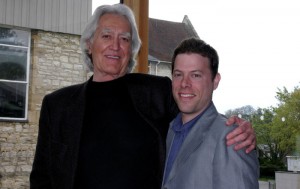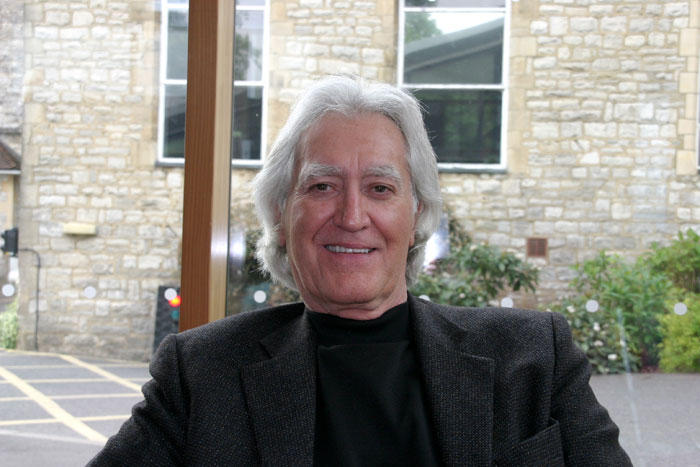Larry Dossey, MD, interviewed by Gil Dekel, PhD.
Gil Dekel: You seem to think that research can combine both scientific and spiritual views.
Larry Dossey: Yes. I used to believe that you had to make a choice in your profession and personal life. There’s science, technology, analysis, intellect and logic on one hand, and spirituality which is said to be irrational and intuitive on the other hand – but I think that’s a false choice. If you look at some of the directions in medical research today you can see that science has brought to bear many spiritual questions. One that has interested me over the years is the area of healing using intention, compassion and love to make a difference in someone’s life at a distance, beyond the reach of the physical senses.
Most people used to believe that this was off limit to science, and yet in the past few years there have been dozens of studies looking at the ability of people to heal others at a distance. These studies involve randomized, double blind controlled scientific approaches. So it’s simply not true that you either ‘do’ science or you ‘do’ spirituality. There has been a coming together and one of the most dramatic examples of that, as I say, is the study of distant healing.
If science and spirituality are coming together, is there a chance they will merge to become one branch of study in the future? Perhaps they already were one branch in the past, as Rudolf Steiner argued. Why do we make a distinction between the two?
We make the distinction between spirituality and science because of bad habits; because of tradition and thinking that is very slow to change. To this day some people believe that spirituality cannot be approached empirically through the methods of science. This is simply an old idea that should be transcended because the evidence is that you can bring things together. But having said that, I would say that you cannot equate science with spirituality; I’ll give you an example of why you cannot. The studies using prayer, intentionality and healing show that if you want the best results, you have to approach this through the heart; through compassion, caring and empathy. And if you take those qualities away from the experiment, the experiments don’t go very well.

‘The place for love, compassion, caring, and empathy…’ (‘Science & Spirituality’ – artwork by Gil Dekel)
Now, you can examine the equations of physics all you want and you will never find any place for love, compassion, caring, or empathy… those things don’t exist in physics – but they’re crucial to healing. So this permits us to say that our most accurate sciences and physics can give us certain insights into healing and the manifestations of consciousness, up to a point. There’s a point at which consciousness and healing go beyond science because those factors of love and compassion are simply not present in physics.
Physics may assist us in understanding certain things but it’s not adequate to describe how consciousness manifests in the world, for example in healing.
So, compassion and love are tools for healing, which do not exist in so-called conventional science as such. What we’re saying here is that the issue is the tool with which we approach information/research?
Yes… there’s an old saying that if you’re fishing and you use a 4-inch mesh net, you’ll never catch a fish that’s smaller than 4 inches, as it will slip through the net. So that tool is not adequate for the task of catching small fish. The same applies in science. You can apply physics and biology and other areas of scientific endeavour to a limited extent. There are things that are going to slip through the scientific net, since science just isn’t competent to deal with these factors of consciousness, caring, love, and compassion. Science is just not equipped to deal with these sorts of things that are absolutely crucial in how we live our lives.
I wonder, why isn’t love seen as a scientific research tool?
When scientists talk about love they talk about brain state. For example, there have been several studies examining why we give chocolates to each other on Valentines Day. And they have identified the chemical in chocolate that increases brain levels of certain chemicals that are believed to stimulate an experience of love. So when science gets its hands on these sorts of things, it does a reductionist analysis of them and tries to come up with a molecular or an atomic understanding. You can do this and you can learn a lot about how the brain works, but you can never come up with the experience of that. You can talk about atomic fluxes and molecular interactions and receptor sites and neurotransmitters, but this is just talk. It doesn’t touch the actual experience. This issue gets close to the problem of consciousness and the relationship between consciousness and the brain.
Many people want to equate consciousness with brain activity. That is the hypothesis in neurological science; that the two are the same. This cannot be true. There is no direct evidence that the brain makes consciousness. No one has ever observed a brain producing consciousness; this is just a huge mystery. It’s an assumption that brain equals consciousness and it’s devastating in many ways. For example, it leads to the assumption that when we die and the brain perishes, then that’s the end of who we are. I think there’s another way of looking at this. We are at the point of being able to say that consciousness transcends the brain.
We know this because of careful experiments showing that consciousnesses can do things that brain cannot do. Consciousness can insert information out there into the world at a distance beyond the reach of what a brain can do. An example is remote healing. Consciousness can also acquire information from the world at a distance in ways that brains cannot. An example is precognition; knowing events before they happen, or remote viewing wherein people can carefully detail pictures of what a distant individual is viewing on the other side of the earth. These studies have been replicated by laboratories around the world. This is no longer a matter of conjecture that consciousness can do this; it’s been demonstrated beyond reasonable doubt – to people who open up and pay attention to it. So we’re at a point where we can say beyond reasonable doubt that the brain and consciousness are simply not the same.
You have coined the term ‘non-local mind’. If the mind or consciousness is non-local, and it is not ‘in’ the brain, then where is it?
William James, the father of American Psychology, believed that consciousness works through the brain but is not produced by it. The brain is a kind of filter through which consciousness works. It might appear that consciousness is made by the brain, but that’s about as silly as saying that the television set makes the picture. It doesn’t make the picture, it comes from somewhere else. It’s manifested on the television screen. In the same way, consciousness may be distributed as a fundamental entity in the world which works through the brain just as a signal works through a television set.
I think that our understanding of consciousness is going to require a new view. The view I favour is one that I call ‘non-local mind’ and I coined this term in print in 1989 in my book ‘Recovering the Soul’. It’s a description of consciousness in many different areas. The basic description is this: the term ‘non-local’ means ‘not localized’. If something is not local it means you can’t put it in a box, in a specific place. It’s not confineable. There are reasons to say that consciousness cannot be confined to brains and bodies and space. It can’t even be confined to the present moment in time. It’s not localizable. It’s everywhere, it’s omnipresent. It’s distributed not just in space but also in time.
There are all sorts of reasons to say that consciousness is infinite in space and time. The philosophical and theological implications are profound; because if something is infinite in time, then it’s immortal. It’s eternal. It’s everywhere in time. So this begins to resemble the old concept of the soul as something that doesn’t die. It doesn’t die with the death of the body and the brain. It endures in time.
This image of non-local mind that comes out of good, solid science these days, points towards immortality. I think this is one of the great benefits of this image of non-local consciousness for the simple reason that it gives hope to people after death. The current ideas that brain equals consciousness have no hope after death. They suggest that total annihilation occurs with death. But the non-local concept of consciousness based on solid science says something different: we’re immortal; consciousness couldn’t die if it tried; it’s infinite in time as well as in space.
There’s also the connection to the ancient idea of the divine within, because these qualities in non-local mind such as infinitude in space and time, are also qualities that have been traditionally ascribed to God, the absolute, the universe, Allah; whatever term we choose to use. So, non-local mind carries with it a notion of connectedness between the absolute, God and endurance. I think this is a magnificent contribution. It helps redeem our old idea of human beings as nothing but worldly fallen creatures and so on. This says something different: we have divine qualities about us.
There’s also a very important ethical implication of this idea of non-local mind. It leads to the idea of the unification of minds. Minds can’t be bounded, walled up, put in a box because they’re non-local with respect to space. If that is so, this leads to the idea of the unification or coming together of all minds to form what our ancestors used to call the universal mind, or what Erwin Schrodinger, the modern Nobel physicist, called the one mind.
If that is an accurate picture of consciousness, the ethical implications are profound – we’d have to admit that ‘what we do to another we do to ourselves’, because of sheer consciousness in the one mind. I think this is important now more than ever, because unless we develop the sense that we’re all connected and that we’re in this together, we’re not going to be able to marshal the kind of fortitude and courage to behave in a better way toward one another and to the world in general. We need to revise our sense of ethics because we face environmental and global challenges that we’ve never faced before.
The non-local mind is not bound to past or future, which brings us to the topic of premonition, seeing into the future. Can someone have a premonition into the past?
Absolutely, that would be what we call a retro-monition; looking backwards instead of premonition, which looks forward. People can have access to information no matter where they’re situated in time, whether it’s in the future or the past. There’s no directionality in time in a non-local world. Although we emphasize premonitions and don’t talk very much about acquiring information from the past, I think it works both ways.
How about the present moment? Can someone have a premonition into the Now?…
People can have an awareness of information past, present, future and at a distance. This is really what we mean by non-local consciousness. Theoretically, all events, past present and future are accessible to a mind that is genuinely non-local, which I believe consciousness is. So there aren’t any limits in terms of distance or time.
People have talked about cosmic consciousness. The great psychologist Carl Jung talked about the collective unconscious, which is the same thing. Jung’s idea was that at some level of awareness or some level of consciousness all information is accessible. In his term, at the level of collective unconsciousness there is what he called a complete relativization of space and time. At the level of the collective unconscious, space and time don’t matter. Jung spent a lot of time collecting evidence showing that this is the way consciousness works.
1 May 2011.
© Larry Dossey and Gil Dekel. Photos: © Gil Dekel.
Interview conducted at the University of Winchester, UK, on 16 April 2011. Larry lives in the USA. Gil lives in the UK. No part or whole of this interview can be reprinted/republished without an explicit permission from Gil Dekel. Larry’s website.






 - Reading with Natalie, book here...
- Reading with Natalie, book here...